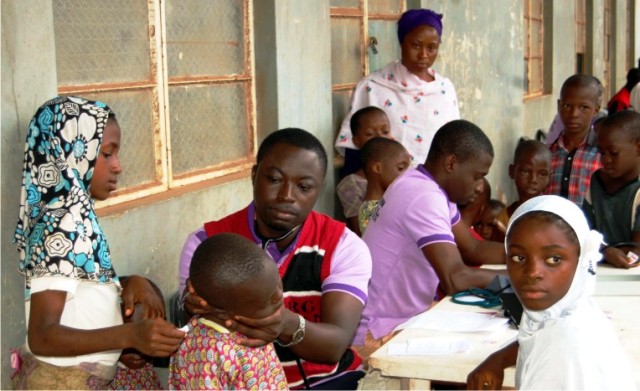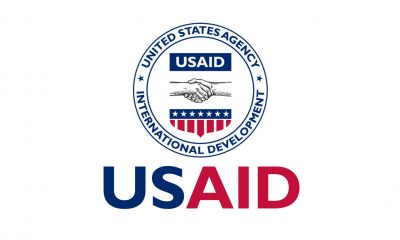Health
Diabetic Children: Expert Harps On Healthy Dieting

Although, the cause of diabetes is not known, parents of diabetic children have been advised to adopt healthy diets and ensure regular medical check-ups for them.
A consultant paediatric endocrinologist, Dr Nwaoma Nwaogu, gave the advice in an interview with The Tide’s source in Abuja, yesterday.
Nwaogu, a member of Ask the Paediatrician Foundation, an NGO, stressed the need to adopt these measures to avoid any complications that might arise for such children.
According to her, careful meal planning is essential for the management of diabetics, hence the need for a total nutritional overhaul for the whole family.
“The management involves careful meal planning. A family that has a diabetic child will need nutritional overhaul; balanced healthy meals at regular times with adequate fruits and vegetables.
“ So this means that the other children in the home and the entire family should eat from the same pot. Regular and balanced meals are the key word.
“Portion control is also essential as it will also prevent the child from developing depression and truancy ideas like stealing,’’ she said.
The expert also dispelled popular beliefs on the health benefits of wheat by diabetic patients, which could do more harm than good for them.
“The idea of wheat meal being beneficial is a common belief but wrong because research has shown that wheat has been involved in autoimmunity and that it has high glycaemic index, which means after a wheat meal, your blood glucose hits the roof rapidly.’’
She, further, encouraged regular eye, urine and blood pressure checks for children suffering from diabetes to prevent complications such as cardiovascular diseases, stroke, kidney failure, damage to the eyes and foot ulcers.
“The child should have regular monitoring of HbA1C, which is a blood test that estimates blood glucose levels over a period of three months and helps identify the risk of complications in the child.’’
She explained that diabetes was a lifelong condition that affected the way our bodies handled energy found in food.
“ Normally, our bodies break down carbohydrates into small blocks called glucose which acts as fuel for the cells in our bodies. Cells in our bodies can only utilise this fuel (glucose blocks) with the help of a hormone called insulin.
“ Insulin acts as a key that opens the door of the cells so that glucose goes in for its use. Insulin is produced by an organ in our bodies called the pancreas.
“ With diabetes mellitus, it’s either you do not produce insulin or the insulin is produced in insufficient quantities or the insulin produced cannot be used or a combination of all,’’ she said.
The paediatrician listed types of diabetes to include type-one, commonly found in children, which shows absolute insulin lack requiring them to use insulin for life.
She added that type-2 diabetes, mostly found in adults and adolescents but increasingly being found in children, shows only relative lack of insulin, which requires a combination of oral medications and insulin.
She further disclosed that some people might develop diabetes following an infection or inflammation of the pancreas, partial or total removal of the pancreas.
“No one really knows what causes diabetes. We do know that some people are more at risk because of the genes that they are born with.
“Something triggers the immune system to start destroying the insulin producing cells in the pancreas.’’
She, therefore, advised parents with diabetic children to ensure they used insulin, engaged in frequent glucose testing and avoided herbs or native concoctions.
She also advised that such children engaged in daily exercise and ate balanced meals.
Health
‘How Micro RNA Research Won Nobel Prize’
Two United States scientists who unraveled the human micro RNA have won the Nobel Prize in Physiology or Medicine 2024.
Victor Ambros and Gary Ruvkun won the coveted prize for their work on microRNA as their discoveries help explain how complex life emerged on earth and how the human body is made up of a wide variety of different tissues.
MicroRNAs influence how genes – the instructions for life – are controlled inside organisms, including humans.
Every cell in the human body contains the same raw genetic information, locked in our DNA.
However, despite starting with the identical genetic information, the cells of the human body are wildly different in form and function.
The electrical impulses of nerve cells are distinct from the rhythmic beating of heart cells. The metabolic powerhouse that is a liver cell is distinct to a kidney cell, which filters urea out of the blood.
The light-sensing abilities of cells in the retina are different in skillset to white blood cells that produce antibodies to fight infection.
So much variety can arise from the same starting material because of gene expression.
The US scientists were the first to discover microRNAs and how they exerted control on how genes are expressed differently in different tissues.
The medicine and physiology prize winners are selected by the Nobel Assembly of Sweden’s Karolinska Institute.
They said: “Their groundbreaking discovery revealed a completely new principle of gene regulation that turned out to be essential for multicellular organisms, including humans.
“It is now known that the human genome codes for over 1,000 microRNAs.”
Health
WHO Begins Regulation On Antibiotic Waste
The World Health Organisation (WHO) has begun acting to curb effects of antibiotic pollution.
The new guidance on wastewater and solid waste management for antibiotic manufacturing sheds light on this important but neglected challenge ahead of the United Nations General Assembly (UNGA) High-Level Meeting on antimicrobial resistance (AMR) taking place on 26 September 2024.
The emergence and spread of AMR caused by antibiotic pollution could undermine the effectiveness of antibiotics globally, including the medicines produced at the manufacturing sites responsible for the pollution.
Despite high antibiotic pollution levels being widely documented, the issue is largely unregulated and quality assurance criteria typically do not address environmental emissions. In addition, once distributed, there is a lack of information provided to consumers on how to dispose of antibiotics when they are not used, for example, when they expire or when a course is finished but there is still antibiotic left over.
“Pharmaceutical waste from antibiotic manufacturing can facilitate the emergence of new drug-resistant bacteria, which can spread globally and threaten our health. Controlling pollution from antibiotic production contributes to keeping these life-saving medicines effective for everyone,” said Dr Yukiko Nakatani, WHO Assistant Director-General for AMR ad interim.
Globally, there is a lack of accessible information on the environmental damage caused by manufacturing of medicines.
“The guidance provides an independent and impartial scientific basis for regulators, procurers, inspectors, and industry themselves to include robust antibiotic pollution control in their standards,” said Dr Maria Neira, Director, Department of Environment, Climate Change and Health, WHO. “Critically, the strong focus on transparency will equip buyers, investors and the general public to make decisions that account for manufacturers’ efforts to control antibiotic pollution.”
Health
Kebbi Harmonises Doctors’ Salaries To Curb Brain Drain
In a concerted effort to curb brain drain, the Kebbi State Government has harmonised medical doctors’ salaries to be at par with their colleagues in the federal government’s tertiary health facilities.
Kebbi State Commissioner for Health, Musa Inusa-Isma’il, disclosed this at the handing over of ambulances to the state-owned health facilities at the Ministry of Health in Birnin Kebbi yesterday.
Inusa Isma’il, according to a statement by Ahmed Idris, the Chief Press Secretary to the governor, said the essence of the harmonisation was to retain the existing medical doctors and attract more to the services of the state.
According to him, the doctors across the state had already started enjoying the new salaries from August 2024.
He said the release of the vehicles was in fulfilment of Governor Nasir Idris’ promise to uplift health care services in the state.
“His Excellency said I should inform you, the beneficiaries of this gesture, that the vehicle should be strictly used for the intended purpose. It should not be used for anything else.
“If there is no referral case, each of the vehicles must be parked at the hospital by 6 pm. The governor said you should warn your drivers against reckless driving as well as violating the instructions.
“We should also do everything possible to reciprocate the gesture by working according to the terms and conditions attached,” he advised.
The benefiting health facilities included Sir Yahaya Memorial Hospital, Birnin Kebbi; State Teaching Hospital, Kalgo; General Hospital, Argungu; General Hospital, Yauri; General Hospital, Zuru; and General Hospital, Bunza.
In his speech, the permanent secretary of the ministry, Dr Shehu Koko, recalled that the ambulances were handed over to the ministry last Friday by the governor for the onward handover to the benefiting hospitals.
He observed that the ambulances would go a long way in improving the referral system in the state, adding that delays in reaching the secondary and tertiary facilities would be eliminated.
The permanent secretary attributed the high rate of maternal mortality in the country to delays in getting to the health facilities for proper medical care.
“We believe with the provision of these ambulances, part of the gaps we have in our referral system will be addressed, whereby patients who require secondary healthcare could be easily transported to secondary and tertiary health centres, where they can get such help,” he said.
In a goodwill message, Commissioner for Information and Culture Alhaji Yakubu Ahmed expressed gratitude to the governor for the support he has given to the ministry to excel.
While advising the beneficiaries to use the vehicles judiciously, the commissioner advised that services and maintenance of the vehicles must be prompt to derive the maximum benefits from the vehicles.
The commissioner also highlighted some achievements recorded by the government in the last year, including beautification of the state capital, completion of a multimillion-naira ultramodern state secretariat, road construction, construction and renovation of classrooms and upgrading of some health facilities, among others.
-

 World5 days ago
World5 days agoPope Francis urges global dialogue to prevent world war
-
Rivers5 days ago
JONAPWD Elections: Commissioner Inaugurates 5-Man Committee
-
Politics5 days ago
When Women Unite To Pray For SIM
-

 Business5 days ago
Business5 days agoUSAID Re-emphasizes Agricultural Collaboration With Nigeria
-

 Featured5 days ago
Featured5 days agoWe’ve Only One House Of Assembly Led By Oko-Jumbo, Fubara Clarifies …Signs Into Law N1.188trn Rivers 2025 Budget
-
Business5 days ago
Agency Partners Foreign Varsity On Climate-Smart Agriculture Advancement
-

 Nation5 days ago
Nation5 days agoNUJ backs proposed strike by Lagos-owned media workers
-

 Niger Delta5 days ago
Niger Delta5 days agoFouchee Celebrates Asari’s Recognition

